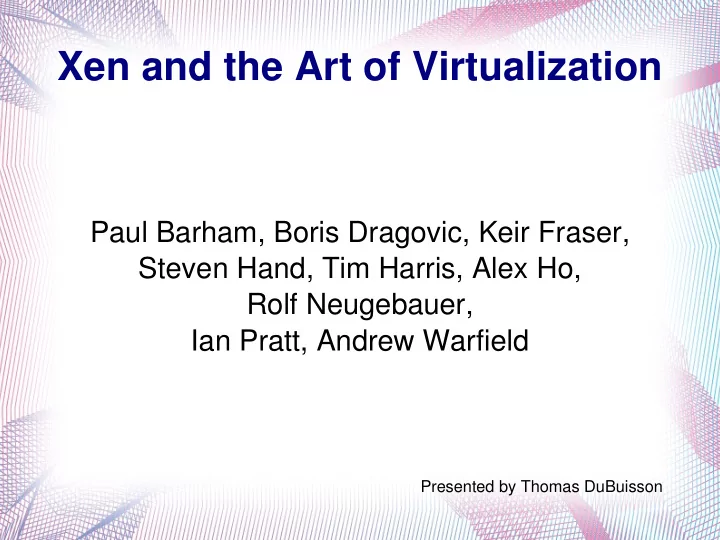

Xen and the Art of Virtualization Paul Barham, Boris Dragovic, Keir Fraser, Steven Hand, Tim Harris, Alex Ho, Rolf Neugebauer, Ian Pratt, Andrew Warfield Presented by Thomas DuBuisson
Outline ● Motivation ● Design – What is the goal? ● Xen Drawing – What does it look like? ● Design Details – How? ● Performance – How Well? ● Beyond the Paper
Motivation Requiring ● server consolidation ● Numerous simultaneous OSes ● co-located hosting ● Isolation of: facilities ● distributed web – IO demands services – Computation ● secure computing – Memory ● Minimal Overhead platforms ● mobility
Design – Basic Concepts ● Unlike micro-kernels of the 90s, hypervisors expose an idealized hardware interface to the higher level processes. ● Unlike typical VMMs, the OS must be modified to cooperate with the hypervisor. Not just for performance, but for basic operation.
Design – Paravirtualization ● Emulation is expensive – minor modifications* to the guest OS, making it more virtualization friendly and has huge performance payoffs. ● Application source code bases are huge – ABI must remain compatible. ● OSes altered in this way are called Paravirtual Machines (PVMs) * 3000 lines of the Linux kernel sufficed ** The Xen patch to the Linux kernel is now over 14000 line
Typical View of Xen ● Interface Provides – CPUs – Memory – IO Devices – Management
Now for details! ● Memory Management ● CPU Virtualization ● IPC – IO Rings – Grant Tables ● Device Access
Memory Management ● Xen was originally x86 specific – No tagged TLB – No software managed TLB ● Guests are provided with a portion of machine memory from which the can allocate to their processes. – No over-committing of physical memory – Instead of modifying the page tables, PVMs perform hypercalls requesting Xen make the desired modification.
Memory Management ● All Page Table and Segment Descriptor updates are validated by Xen. ● On page faults, Xen copies the faulting address from CR2 into a stack frame and send an event to the corresponding guest.
CPU Virtualization ● Xen runs in privileged mode (ring 0) ● Guest OS kernels run unprivileged (exact mode varies by architecture) ● Protected operations instead are performed by hypercalls from the guest to Xen.
CPU Virtualization ● Exceptions are propagated to the guest from Xen via event channels. ● Exceptions from system calls call directly from application into the guest OS. – Guest OS registers a 'fast' exception hander. – Xen validates the address is part of the guest address space and installs the handler.
Inter VM Communication (IVC) ● Hypercalls – Like syscalls, but occur from PVM to Xen ● Events – Xen sets a bitmask to specify which event(s) occurred then calls a previously registered handler belonging to the relevant domain.
Advanced IVC: IO Rings and Grant Tables ● IO Rings allow high bandwidth two-way communication: – Each cell of the ring contains a grant reference – Grant references indicate the ability to map memory or completely transfer a page of memory
IO Devices ● Network cards – Implemented as two rings (transmit, receive) – Rings allow communication between a 'front- end' and 'back-end' network driver. ● Guests are assigned virtual block devices – Access to devices is governed by a round robbin scheduler.
Control ● Start new domains? Domain 0 ● Drivers for physical devices? Domain 0 ● Run device back-ends? Domain 0 ● What is Domain 0? Linux
Performance (Macro)
Performance (Net) ● Near native performance for typical MTU ● Note the lack of CPU usage data during network activity ● Comparison with VMWare Workstation rather unfair
Performance (Micro) ● Typically better than Linux with SMP support. ● Even when significantly worse than Native, its much better than UML or VMW.
Performance (Multi-Guest)
Performance (Scalability) ● Up to 192 domains... then crash
Auxiliary Slides
How Xen Should Look ● Security wise it is similar to single server micro kernels ● Perhaps IO-MMU will help change that.
IO-Rings ● Not a Xen primitive! – Use the initial communication path with Dom0 to setups a grant-ref with the other domain via XenStore or similar. Yes, this is a hack. – Mapping in the grant-ref results in a shared page between the two domains desiring to communication. The IO-Ring may reside here. – The IO-Ring is just a fast way to communicate more grant references!
Non-Standard PVMs ● Linux, *BSD, and Smaller, special, OSes exist: ● – Mini-OS: 'C' based for Windows XP can all generic use. ● 12000 lines be ran as PVMs to ● 4MB needed when running some extent. – StubDom: Based on Mini-OS ● 4MB needed ● Traditionally, these ● Richer (standard C libraries included) ● Intended for driver take up significant domains – memory (which we HaLVM: Can compile Haskell code to run on bare Xen. ● 6MB needed can't over-allocate!) ● Extremely rich, high level language ● Experimental and not yet released to the public
IVC Issues to Consider ● For intra-PC network communication too many context switches are needed – A builds gntref (hypercall to signal B) – B receives ref (hypercall to transfer page) – B builds response, A recieves response ● To setup Guest to Guest communication, XenStore is a free for all security blood bath.
Questions? Comments?
Recommend
More recommend